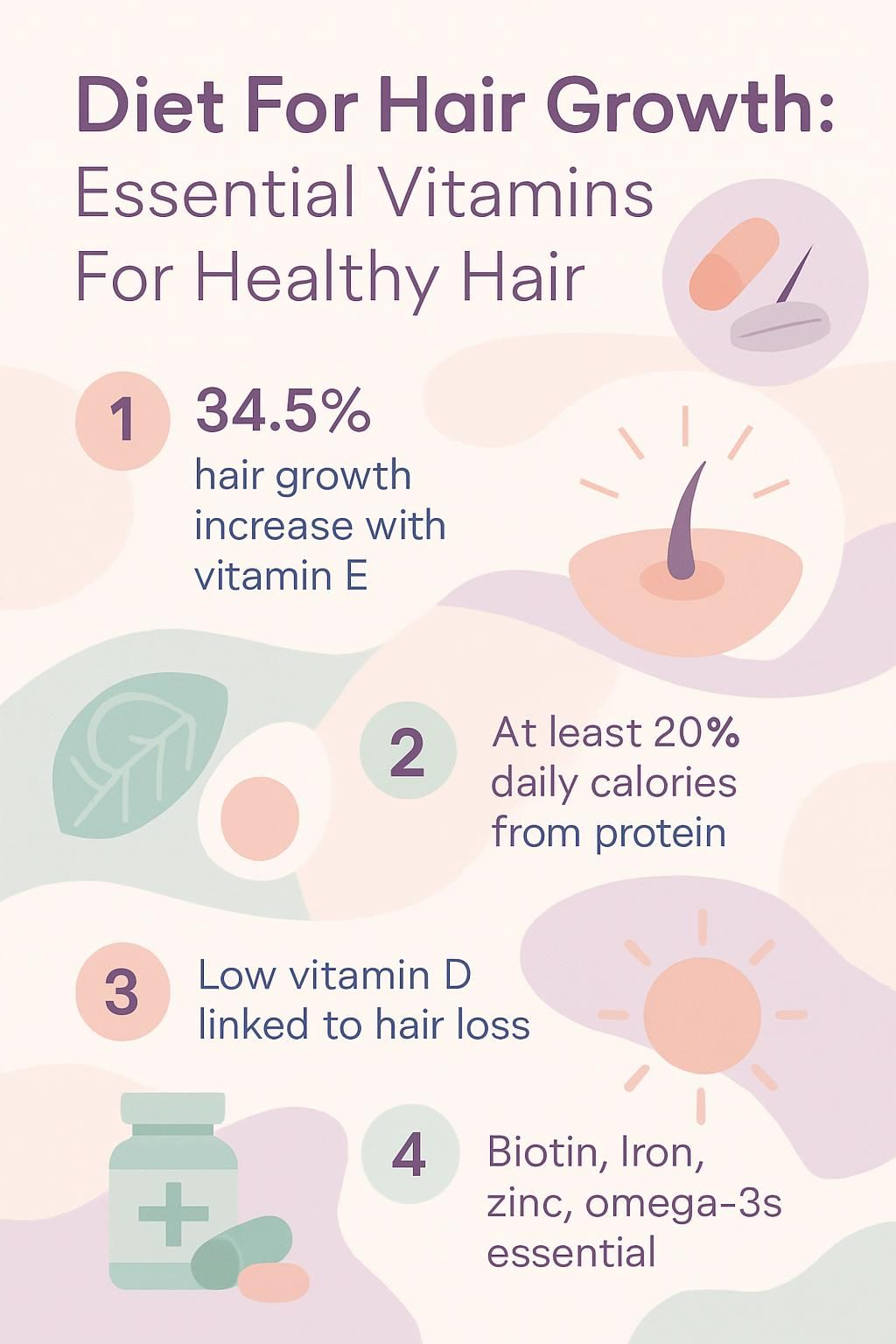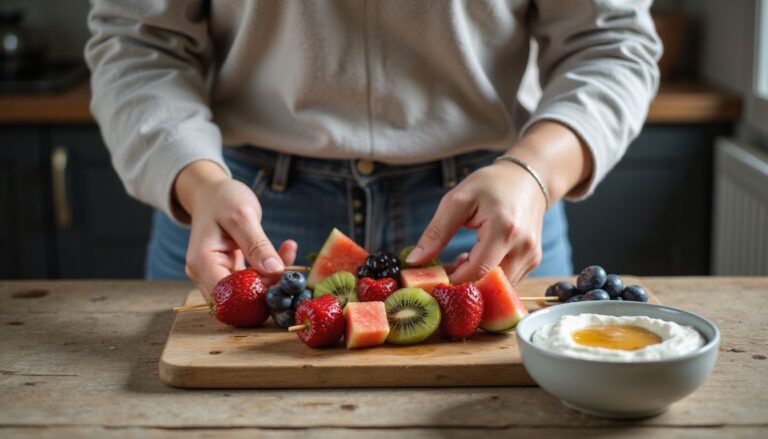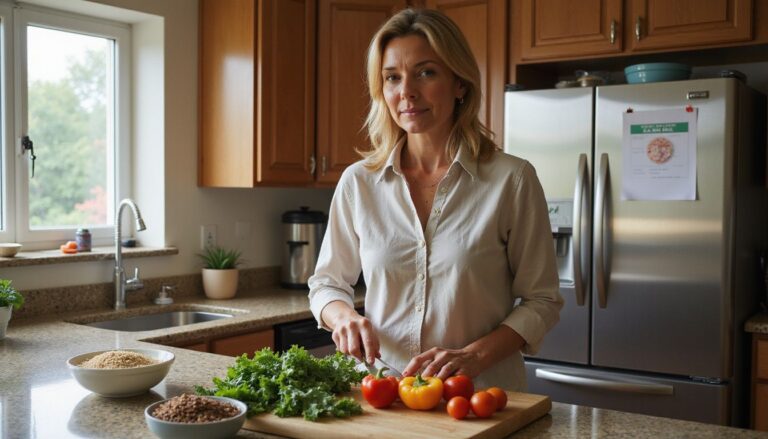Diet For Hair Growth: Essential Vitamins For Healthy Hair
Our Nutrition Assistant AI Suite will transform your body. You will lose fat, get toned, and build muscle. Gain confidence and optimal health.
If your hair feels thinner or sheds more than usual, diet can be part of the story. Nutritional deficiencies often contribute to hair loss, while a balanced diet supports steady hair growth and stronger strands.
This guide on Diet For Hair Growth explains which vitamins, minerals, and foods help you build healthier hair. You will find simple meal ideas, evidence-backed tips, and smart ways to support your scalp each day.
Key Takeaways
- Balanced eating with enough protein, biotin, iron, zinc, and omega-3 fats supports hair growth and lowers shedding.
- Eggs, salmon, spinach, beans, avocados, nuts, berries, sweet peppers, and oysters supply vitamins A, C, D, E, and B-complex for healthy hair.
- In one study, vitamin E supplementation increased hair count by 34.5% over eight months. Low vitamin D is linked with alopecia areata and female pattern hair loss.
- Limit sugary snacks, excessive alcohol, and high-mercury fish to reduce breakage and thinning linked to poor nutrient status or toxicity.
- Aim for about 20% of daily calories from lean protein to support keratin, the main hair protein, and to maintain stronger follicles.

How Does a Balanced Diet Promote Hair Growth?

Your daily meals shape the strength, shine, and thickness of your hair. Protein builds hair structure, and healthy fats and complex carbs fuel the follicles that make each strand.
Mediterranean-style eating, which focuses on vegetables, whole grains, seafood, beans, and olive oil, is linked with better hair health. Low-calorie or very low-carb diets can stress the body and trigger telogen effluvium, a temporary shedding phase.
Many dietitians suggest about 20% of calories from protein and 20 to 30% from healthy fats. This balance supports the hair shaft and the natural growth-rest cycle of follicles.
A healthy outside starts from the inside.
Medical note: This article is educational and not a substitute for medical care. Sudden, patchy, or painful hair loss needs prompt evaluation by a licensed clinician.
Vital Nutrients Essential for Healthy Hair
Hair growth depends on steady supplies of key nutrients. Shortfalls in these vitamins and minerals can weaken strands or slow growth.
What Role Does Protein Play in Hair Structure?
About 95% of each hair strand is keratin, a structural protein. Without enough dietary protein, hair can grow slowly, look limp, and break more easily.
Plan roughly one fifth of your daily calories from lean protein sources such as chicken, fish, eggs, tofu, beans, nuts, and seeds. A 3.5 ounce serving of cooked lean beef provides about 29 grams of protein and supports keratin building.
Research links low protein intake with increased shedding and poor hair quality. Getting complete amino acids helps your body make strong keratin, which supports fuller, less brittle hair.
How Does Biotin Enhance Keratin Production?
Biotin, a B vitamin, helps your body turn food into energy and supports keratin production. You can find it in eggs, sweet potatoes, nuts, seeds, and avocados.
Many supplements promote biotin for hair regrowth. For most healthy adults who eat varied diets, true biotin deficiency is uncommon. High-dose biotin can interfere with certain lab tests, so food-first is the safest approach unless your clinician advises otherwise.
Many patients with hair loss look to dietary supplement options before seeking medical treatment.
Why Is Iron Important for Preventing Hair Loss?
Iron helps red blood cells deliver oxygen to hair follicles. Low iron can lead to telogen effluvium, a reversible form of hair loss often tied to anemia.
Choose iron sources such as lean red meat, beans, spinach, and fortified cereals. One cup of raw spinach supplies iron and about 20% of daily vitamin A, while black beans add iron plus helpful zinc.
After shifting to more plant-based meals, I added lentils and tofu. Within three months, my nails felt stronger and shedding slowed.
How Does Zinc Support Hair Follicle Health?
Zinc helps follicles grow and repair. Low zinc can trigger telogen effluvium, which often improves once levels are restored.
One medium oyster can provide up to most of your daily zinc needs. Black beans also contribute, offering a meaningful portion per 3.5 ounce serving. Focus on food sources first, since too much supplemental zinc can cause problems.
Why Are Omega-3 Fatty Acids Important for Scalp Nourishment?
Omega-3 fats calm inflammation and support the scalp environment where follicles live. Lower inflammation can reduce thinning and support density.
Seafood like salmon and sardines, plus flaxseeds, chia seeds, and walnuts, supply omega-3s. In a study of 120 women, supplements with omega-3 and omega-6 reduced shedding and improved hair density over time.
How Does Vitamin A Aid Sebum Production?
Vitamin A helps your skin make sebum, the natural oil that conditions your scalp and hair. Adequate sebum keeps hair softer and less prone to breakage.
Sweet potatoes, carrots, spinach, and squash are rich in vitamin A. A medium sweet potato can provide up to 160% of daily needs. Avoid excess from supplements since too much vitamin A can contribute to hair loss.
What Is the Importance of Vitamin C for Collagen Production?
Vitamin C supports collagen, the protein that gives hair structure and resilience. It also helps your body absorb iron from plant foods.
One cup of strawberries has about 85 mg of vitamin C. Yellow sweet peppers offer very high amounts per pepper. I noticed fewer nail breaks after I added citrus and berries to my breakfast.
Vitamin C-rich foods like berries, guava, citrus, and broccoli also provide antioxidants, which protect follicles from oxidative stress.
How Does Vitamin E Protect Hair from Environmental Damage?
Vitamin E acts as an antioxidant, shielding follicles from free radical damage caused by pollution and UV light. In one trial, vitamin E supplementation increased hair count by 34.5% over eight months.
Avocados, almonds, sunflower seeds, and trout are reliable sources. A medium avocado supplies about 28% of daily needs. An ounce of almonds or sunflower seeds can deliver nearly half of your daily value.
Why Is Vitamin D Crucial for Hair Follicle Cycling?
Vitamin D helps start and maintain the hair growth cycle. Low levels are linked with conditions like alopecia areata and female pattern hair loss.
You get vitamin D from sunlight and foods like eggs, salmon, herring, sardines, and canned tuna. My own level dropped to 12 ng/mL after a move to a cloudy area. After three months of supplements and more oily fish, baby hairs appeared and shedding eased.
Many specialists suggest testing nutrients before trying other treatment for hair loss options. Addressing a deficiency can be a fast win.
How Does Folic Acid Promote Hair Growth?
Folic acid, a form of vitamin B9, supports DNA synthesis and fast cell division in follicles. Since hair cells divide quickly, they need steady folate intake.
Leafy greens and beans are strong folate sources. Adequate intake supports new cell formation in hair roots and helps maintain a healthy scalp.
Nutrient-Rich Foods that Support Hair Growth
Filling your plate with nutrient-dense foods helps your scalp, follicles, and strands work as a team. Here are reliable choices to keep in rotation.
Why Are Eggs Good for Protein and Biotin?
Eggs offer complete protein and biotin, both vital for keratin. One large egg has about 6 grams of protein, plus vitamin D in the yolk.
Regular egg intake can support stronger strands and better shine. I added eggs after low iron from a vegetarian pattern, and within months both nails and hair looked healthier.
How Do Berries Help With Antioxidants and Vitamin C?
Strawberries, blueberries, and blackberries deliver antioxidants and vitamin C that protect follicles and boost collagen.
One cup of strawberries provides about 85 milligrams of vitamin C. These fruits are an easy, low-calorie way to support hair structure while improving iron absorption.
What Nutrients in Spinach Support Hair Health?
Spinach includes vitamin A for sebum, vitamin C for collagen and iron uptake, iron for oxygen delivery, and folate for new cell growth.
Because spinach is nutrient-dense and low in calories, it fits well in plant-based and mixed diets. It helps prevent gaps that can affect hair quality.
Why Is Fatty Fish Beneficial for Omega-3s and Protein?
Fatty fish such as salmon and sardines supply omega-3s, high-quality protein, and vitamin D. Omega-3s nourish follicles and calm an irritated scalp.
In research with 120 women, omega-3 supplementation reduced loss and improved density. Protein helps maintain the hair shaft, and vitamin D supports normal follicle cycling.
How Do Sweet Potatoes Provide Beta-Carotene?
Sweet potatoes are rich in beta-carotene, which the body converts to vitamin A. A medium sweet potato can cover well over your daily need.
Vitamin A supports sebum production and protects follicles from environmental stress. The complex carbs also provide steady energy for fast-growing hair cells.
What Hair Benefits Do Avocados Offer?
Avocados provide healthy fats that keep hair flexible and less prone to snapping. They also supply vitamin E, a key antioxidant for scalp comfort.
These fats help your body absorb vitamins A, D, E, and K. Many people notice better shine and fewer split ends after adding avocado to salads or toast.
Which Vitamins and Minerals Do Nuts and Seeds Provide?
Nuts and seeds are packed with vitamin E, B vitamins, zinc, plant protein, and healthy oils. An ounce of almonds or sunflower seeds can meet close to half of daily vitamin E needs.
Flaxseeds and chia supply omega-3s for scalp nourishment. Selenium in some seeds also helps defend follicles from free radical damage.
How Do Sweet Peppers Support Hair Growth?
Yellow sweet peppers are one of the richest vitamin C sources. Vitamin C supports collagen production and helps keep the scalp environment healthy.
Sweet peppers also add vitamin A, which supports natural oils on the scalp. This combination helps each strand stay strong and moisturized.
Why Are Beans Rich in Protein, Iron, and Zinc?
Beans deliver plant protein for keratin, plus iron and zinc for follicle repair. Black beans provide a helpful share of daily zinc in a modest serving.
Beans also offer biotin and folate for new cell growth and steady blood sugar for long-lasting energy. Adding beans to soups and salads helped me shed less during stressful school periods.
What Makes Oysters an Excellent Source of Zinc?
Oysters are one of the best dietary sources of zinc, which supports growth and repair. The mineral is easy to absorb from shellfish.
Including oysters now and then can help close nutrient gaps without adding many calories. I noticed fuller strands after leaning on mineral-rich whole foods such as oysters and crab.
How Does Hydration Affect Scalp and Hair Health?
Water carries nutrients to follicles and keeps the scalp comfortable. Aim for at least 64 ounces daily, more in hot weather or during exercise.
Good hydration supports shine, elasticity, and fewer split ends. Living in a dry climate, I felt less scalp itch and saw fewer broken hairs after I raised my water intake.
What Foods Should Be Avoided to Improve Hair Growth?
Certain choices can interfere with hair growth and weaken follicles. Reducing these items can protect your strands while you improve your overall nutrition.
Why Reduce Sugary and Processed Foods?
Processed snacks often lack essential vitamins and minerals, such as vitamin B6, vitamin D, iron, and zinc. They can displace nutrient-rich foods like eggs, spinach, and beans.
High sugar intake can trigger inflammation and hormone swings that affect hair and scalp health. After swapping sweet cereals for whole-food breakfasts, my scalp felt less oily and breakage dropped.
How Does Alcohol Impact Hair Health?
Too much alcohol dries the scalp and hair and reduces absorption of key nutrients, including vitamin B12, zinc, iron, and folate. It can increase oxidative stress, which damages hair proteins.
Alcohol can also disturb hormones involved in hair cycling. Cutting back supports better nutrient delivery to follicles and more consistent keratin formation.
What Are the Risks of Eating High Mercury Fish?
High-mercury fish raise the risk of mercury buildup, which can harm follicle cells and disrupt growth cycles. Mercury also interferes with nutrient use inside cells.
Choose low-mercury species such as salmon or sardines. You still get omega-3 benefits with far less risk to scalp and hair.
How Can You Integrate Hair-Beneficial Foods into Your Diet?
Small changes add up. Build most meals around protein, colorful produce, whole grains, and healthy fats so you cover hair needs without overthinking it.
How to Create Balanced Meal Plans for Hair Health?
Start meals with a protein anchor, such as eggs, beans, yogurt, chicken, or fish. Add whole grains like oats or brown rice for steady energy and thyroid-friendly minerals such as selenium.
Fill half your plate with leafy greens and bright fruits for vitamin C and beta-carotene. A practical target is 20% of calories from protein, 20 to 30% from healthy fats like olive oil or avocado, and 45 to 60% from complex carbs.
Drink about 64 ounces of water per day. I often make a Mediterranean-style salad with spinach, bell peppers, chickpeas, pumpkin seeds, and grilled salmon, finished with extra virgin olive oil.
Why Choose Fresh, Whole Ingredients?
Fresh foods keep more vitamins and minerals than highly processed items. They also avoid extra sugars and poor-quality fats that can irritate the scalp.
Eggs offer protein and biotin for keratin building, and fresh produce raises antioxidant levels that protect follicles. Whole-food patterns also improve hydration and help prevent nutrient gaps tied to hair loss.
What Are Healthy Cooking Methods for Hair Nutrition?
Steaming, baking, and grilling protect vitamins and healthy oils. Deep frying can damage omega-3s and reduce heat-sensitive vitamins like C and E.
Use olive or canola oil in modest amounts. Lightly cook leafy greens to aid nutrient absorption. At home, I steam broccoli or roast sweet potatoes with minimal oil to keep flavor and nutrition intact.
What Is the Impact of Supplements on Hair Growth?
Supplements can help if a lab test confirms a deficiency. Food-first remains the foundation because whole foods deliver many nutrients that work together.
When Are Hair Growth Supplements Beneficial?
Clinicians may suggest iron if tests show low ferritin or anemia. People with absorption issues, such as certain digestive disorders, may need specific vitamins because food alone may not be enough.
If you follow a strict low-carb plan, your intake of hair-supporting nutrients might fall short. Work with a healthcare professional since supplements can interact with medicines. Testing my vitamin D and treating a deficiency helped reverse my shedding within three months.
What Are Popular Hair Growth Supplements?
Many products include biotin, B vitamins, zinc, iron, vitamin D, omega-3 fats, and vitamin E. A balanced multivitamin that meets 100% of daily values can be reasonable if your diet is limited.
Vitamin D can help when hair loss is linked to low levels. In research on 120 women, omega-3s reduced shedding and improved density. Vitamin E increased hair counts by roughly one third in eight months. Use zinc with care since too much may cause side effects.
In my case, a general multivitamin improved energy and thinned areas after several months. Discuss the right formula with your clinician for safe, targeted results.
What Lifestyle Choices Affect Hair Health?
Daily habits can support your diet for healthy hair or work against it. Small improvements in stress, sleep, and tobacco use can show up on your scalp.
How Does Stress Control Improve Hair Growth?
High stress can push follicles into a resting phase, which raises shedding. Stress control helps stabilize hormones and supports steady growth cycles.
Try brief meditation, walks, or breathing drills to boost scalp blood flow. Ten minutes of morning breathing helped me choose better breakfasts and stay consistent with nutrient-dense meals.
Why Is Sufficient Sleep Important for Hair Health?
Deep sleep supports repair inside follicles. Poor sleep can raise stress hormones and disrupt hair cycles.
Regular, quality rest also supports nutrient absorption and cell renewal. People who sleep well often notice stronger, shinier hair over time.
How Does Smoking Affect Hair Growth?
Smoking limits blood flow to follicles and exposes hair to toxins. Over time, this can slow growth, increase shedding, and change texture.
Quitting improves oxygen delivery and nutrient transport to roots. My own hair looked fuller and brighter after I stopped smoking.
Conclusion
A balanced diet rich in protein, iron, zinc, omega-3 fats, and key vitamins supports healthy hair growth. Eggs, fatty fish, beans, nuts, berries, spinach, and sweet peppers provide the building blocks your scalp needs. Hydration matters, and cutting back on processed sweets, alcohol, and high-mercury fish helps prevent setbacks.
If shedding is heavy, sudden, or patchy, seek medical advice and consider lab tests for common deficiencies such as iron or vitamin D. With steady nutrient intake and smart habits, you can support stronger strands over time.
Evidence notes: Key findings referenced from peer-reviewed studies and public health resources, including Journal of Cosmetic Dermatology on vitamin E and hair counts, and NIH fact sheets on vitamins and minerals.
FAQs
1. Which vitamins are most important for healthy hair growth?
Vitamin B7, also called biotin, helps strengthen strands and supports new growth. Vitamin D aids in creating new follicles. Vitamin C assists with collagen production and iron absorption, both vital for strong hair. Studies show that low levels of these nutrients can lead to thinning or slow regrowth.
2. How does diet affect the health of your scalp and hair?
A balanced eating plan rich in protein, zinc, iron, and essential vitamins provides building blocks for keratin formation. For example, research from Harvard Medical School found that people who eat enough protein have thicker strands than those who do not meet daily needs.
3. Can supplements replace a nutrient-rich meal plan for better hair?
Supplements may help fill gaps if you lack certain nutrients; however, whole foods offer more benefits due to fiber and other compounds they contain. My own experience showed improved texture after adding eggs and leafy greens rather than relying only on pills.
4. What foods should I include each week to support stronger locks?
Include salmon or sardines twice weekly for omega-3s; add spinach or kale often for vitamin A; snack on nuts like almonds for vitamin E; choose citrus fruits such as oranges to boost vitamin C intake.
Summary: Eating a variety of nutrient-dense foods ensures your body gets key vitamins needed for optimal strand strength and shine while supporting overall wellness according to current scientific evidence.







